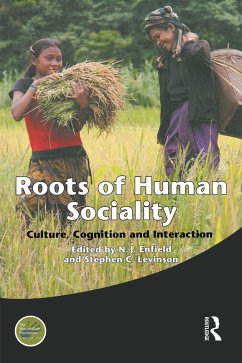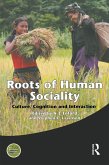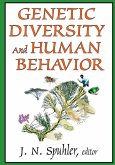Roots of Human Sociality (eBook, PDF)
Culture, Cognition and Interaction
Redaktion: Levinson, Stephen C.; Enfield, Nicholas J.
39,95 €
39,95 €
inkl. MwSt.
Sofort per Download lieferbar

20 °P sammeln
39,95 €
Als Download kaufen

39,95 €
inkl. MwSt.
Sofort per Download lieferbar

20 °P sammeln
Jetzt verschenken
Alle Infos zum eBook verschenken
39,95 €
inkl. MwSt.
Sofort per Download lieferbar
Alle Infos zum eBook verschenken

20 °P sammeln
Roots of Human Sociality (eBook, PDF)
Culture, Cognition and Interaction
Redaktion: Levinson, Stephen C.; Enfield, Nicholas J.
- Format: PDF
- Merkliste
- Auf die Merkliste
- Bewerten Bewerten
- Teilen
- Produkt teilen
- Produkterinnerung
- Produkterinnerung

Bitte loggen Sie sich zunächst in Ihr Kundenkonto ein oder registrieren Sie sich bei
bücher.de, um das eBook-Abo tolino select nutzen zu können.
Hier können Sie sich einloggen
Hier können Sie sich einloggen
Sie sind bereits eingeloggt. Klicken Sie auf 2. tolino select Abo, um fortzufahren.

Bitte loggen Sie sich zunächst in Ihr Kundenkonto ein oder registrieren Sie sich bei bücher.de, um das eBook-Abo tolino select nutzen zu können.
This book marks an exciting convergence towards the idea that human culture and cognition are rooted in the character of human social interaction, which is unique in the animal kingdom.
- Geräte: PC
- ohne Kopierschutz
- eBook Hilfe
- Größe: 121.95MB
Andere Kunden interessierten sich auch für
![Roots of Human Sociality (eBook, ePUB) Roots of Human Sociality (eBook, ePUB)]() Roots of Human Sociality (eBook, ePUB)39,95 €
Roots of Human Sociality (eBook, ePUB)39,95 €![Children of the Blood (eBook, PDF) Children of the Blood (eBook, PDF)]() Bernard JuilleratChildren of the Blood (eBook, PDF)38,95 €
Bernard JuilleratChildren of the Blood (eBook, PDF)38,95 €![Schism and Continuity in an African Society (eBook, PDF) Schism and Continuity in an African Society (eBook, PDF)]() Victor TurnerSchism and Continuity in an African Society (eBook, PDF)39,95 €
Victor TurnerSchism and Continuity in an African Society (eBook, PDF)39,95 €![Genetic Diversity and Human Behavior (eBook, PDF) Genetic Diversity and Human Behavior (eBook, PDF)]() J. N. SpuhlerGenetic Diversity and Human Behavior (eBook, PDF)52,95 €
J. N. SpuhlerGenetic Diversity and Human Behavior (eBook, PDF)52,95 €![Common Worlds and Single Lives (eBook, PDF) Common Worlds and Single Lives (eBook, PDF)]() Common Worlds and Single Lives (eBook, PDF)39,95 €
Common Worlds and Single Lives (eBook, PDF)39,95 €![The New Volunteerism (eBook, PDF) The New Volunteerism (eBook, PDF)]() Catherine CavanaughThe New Volunteerism (eBook, PDF)45,95 €
Catherine CavanaughThe New Volunteerism (eBook, PDF)45,95 €![The Origins and Nature of Sociality (eBook, PDF) The Origins and Nature of Sociality (eBook, PDF)]() Robert W. SussmanThe Origins and Nature of Sociality (eBook, PDF)45,95 €
Robert W. SussmanThe Origins and Nature of Sociality (eBook, PDF)45,95 €-
-
-
This book marks an exciting convergence towards the idea that human culture and cognition are rooted in the character of human social interaction, which is unique in the animal kingdom.
Dieser Download kann aus rechtlichen Gründen nur mit Rechnungsadresse in A, B, BG, CY, CZ, D, DK, EW, E, FIN, F, GR, HR, H, IRL, I, LT, L, LR, M, NL, PL, P, R, S, SLO, SK ausgeliefert werden.
Produktdetails
- Produktdetails
- Verlag: Taylor & Francis eBooks
- Seitenzahl: 546
- Erscheinungstermin: 21. August 2020
- Englisch
- ISBN-13: 9781000325423
- Artikelnr.: 60038302
- Verlag: Taylor & Francis eBooks
- Seitenzahl: 546
- Erscheinungstermin: 21. August 2020
- Englisch
- ISBN-13: 9781000325423
- Artikelnr.: 60038302
- Herstellerkennzeichnung Die Herstellerinformationen sind derzeit nicht verfügbar.
Nicholas J. Enfield and Stephen C. Levinson are at the Max Planck Institute for Psycholinguistics, Nijmegen, the Netherlands.
* Introduction: Human Sociality as a New Interdisciplinary FieldN.J.
Enfield and Stepehn C. Levinson* Part 1: Properties of Human Interaction*
On the Human 'Interaction Engine'Stephen C. Levinson* Interaction: The
Infrastructure for Social Institutions, the Natural Ecological Niche for
Language, and the Arena in which Culture is EnactedEmanuel A. Schegloff*
Human Sociality as Mutual Orientation in a Rich Interactive Environment:
Multimodal Utterances and Pointing in AphasiaCharles Goodwin* Social
Actions, Social CommitmentsHerbert H. Clark* Part 2: Psychological
Foundations* Infant Pointing at 12 Months: Communicative Goals, Motives,
and Social-Cognitive AbilitiesUlf Liszkowski* The Development
Interdependence of Theory of Mind and LanguageJanet Wilde Astington*
Constructing the Social Mind: Language and False-Belief UnderstandingJennie
E. Pyers* Sylvia's Recipe: The Role of Imitation and Pedagogy in the
Transmission of Cultural KnowledgeGyörgy Gergely and Gergely Csibra* Part
3: Culture and Sociality* The Thought that Counts: The Interactional
Consequences of Variation in Cultural Theories of MeaningEve Danziger*
Cultural Perspectives on Infant-Caregiver InteractionSuzanne Gaskins* Joint
Commitment and Common Ground in a Ritual EventWilliam F. Hanks* Habits and
Innovations: Designing Language for New, Technologically Mediated
SocialityElizabeth Keating* Part 4: Cognition in Interaction* Meeting Other
Minds through Gesture: How Children Use their Hands to Reinvent Language
and Distribute CognitionSusan Goldin-Meadow* The Distributed Cognition
Perspective on Human InteractionEdwin Hutchins* Social Consequences of
Common Ground N.J. Enfield* Why a Deep Understanding of Cultural Evolution
is Incompatible with Shallow PsychologyDan Sperber* Part 5: Evolutionary
Perspectives* Culture and the Evolution of the Human Social Instincts R.
Boyd and P. J. Richerson* Parsing Behavior: A Mundane Origin for an
Extraordinary Ability?Richard W. Byrne* Why Don't Apes Point?Michael
Tomasello
Enfield and Stepehn C. Levinson* Part 1: Properties of Human Interaction*
On the Human 'Interaction Engine'Stephen C. Levinson* Interaction: The
Infrastructure for Social Institutions, the Natural Ecological Niche for
Language, and the Arena in which Culture is EnactedEmanuel A. Schegloff*
Human Sociality as Mutual Orientation in a Rich Interactive Environment:
Multimodal Utterances and Pointing in AphasiaCharles Goodwin* Social
Actions, Social CommitmentsHerbert H. Clark* Part 2: Psychological
Foundations* Infant Pointing at 12 Months: Communicative Goals, Motives,
and Social-Cognitive AbilitiesUlf Liszkowski* The Development
Interdependence of Theory of Mind and LanguageJanet Wilde Astington*
Constructing the Social Mind: Language and False-Belief UnderstandingJennie
E. Pyers* Sylvia's Recipe: The Role of Imitation and Pedagogy in the
Transmission of Cultural KnowledgeGyörgy Gergely and Gergely Csibra* Part
3: Culture and Sociality* The Thought that Counts: The Interactional
Consequences of Variation in Cultural Theories of MeaningEve Danziger*
Cultural Perspectives on Infant-Caregiver InteractionSuzanne Gaskins* Joint
Commitment and Common Ground in a Ritual EventWilliam F. Hanks* Habits and
Innovations: Designing Language for New, Technologically Mediated
SocialityElizabeth Keating* Part 4: Cognition in Interaction* Meeting Other
Minds through Gesture: How Children Use their Hands to Reinvent Language
and Distribute CognitionSusan Goldin-Meadow* The Distributed Cognition
Perspective on Human InteractionEdwin Hutchins* Social Consequences of
Common Ground N.J. Enfield* Why a Deep Understanding of Cultural Evolution
is Incompatible with Shallow PsychologyDan Sperber* Part 5: Evolutionary
Perspectives* Culture and the Evolution of the Human Social Instincts R.
Boyd and P. J. Richerson* Parsing Behavior: A Mundane Origin for an
Extraordinary Ability?Richard W. Byrne* Why Don't Apes Point?Michael
Tomasello
* Introduction: Human Sociality as a New Interdisciplinary FieldN.J.
Enfield and Stepehn C. Levinson* Part 1: Properties of Human Interaction*
On the Human 'Interaction Engine'Stephen C. Levinson* Interaction: The
Infrastructure for Social Institutions, the Natural Ecological Niche for
Language, and the Arena in which Culture is EnactedEmanuel A. Schegloff*
Human Sociality as Mutual Orientation in a Rich Interactive Environment:
Multimodal Utterances and Pointing in AphasiaCharles Goodwin* Social
Actions, Social CommitmentsHerbert H. Clark* Part 2: Psychological
Foundations* Infant Pointing at 12 Months: Communicative Goals, Motives,
and Social-Cognitive AbilitiesUlf Liszkowski* The Development
Interdependence of Theory of Mind and LanguageJanet Wilde Astington*
Constructing the Social Mind: Language and False-Belief UnderstandingJennie
E. Pyers* Sylvia's Recipe: The Role of Imitation and Pedagogy in the
Transmission of Cultural KnowledgeGyörgy Gergely and Gergely Csibra* Part
3: Culture and Sociality* The Thought that Counts: The Interactional
Consequences of Variation in Cultural Theories of MeaningEve Danziger*
Cultural Perspectives on Infant-Caregiver InteractionSuzanne Gaskins* Joint
Commitment and Common Ground in a Ritual EventWilliam F. Hanks* Habits and
Innovations: Designing Language for New, Technologically Mediated
SocialityElizabeth Keating* Part 4: Cognition in Interaction* Meeting Other
Minds through Gesture: How Children Use their Hands to Reinvent Language
and Distribute CognitionSusan Goldin-Meadow* The Distributed Cognition
Perspective on Human InteractionEdwin Hutchins* Social Consequences of
Common Ground N.J. Enfield* Why a Deep Understanding of Cultural Evolution
is Incompatible with Shallow PsychologyDan Sperber* Part 5: Evolutionary
Perspectives* Culture and the Evolution of the Human Social Instincts R.
Boyd and P. J. Richerson* Parsing Behavior: A Mundane Origin for an
Extraordinary Ability?Richard W. Byrne* Why Don't Apes Point?Michael
Tomasello
Enfield and Stepehn C. Levinson* Part 1: Properties of Human Interaction*
On the Human 'Interaction Engine'Stephen C. Levinson* Interaction: The
Infrastructure for Social Institutions, the Natural Ecological Niche for
Language, and the Arena in which Culture is EnactedEmanuel A. Schegloff*
Human Sociality as Mutual Orientation in a Rich Interactive Environment:
Multimodal Utterances and Pointing in AphasiaCharles Goodwin* Social
Actions, Social CommitmentsHerbert H. Clark* Part 2: Psychological
Foundations* Infant Pointing at 12 Months: Communicative Goals, Motives,
and Social-Cognitive AbilitiesUlf Liszkowski* The Development
Interdependence of Theory of Mind and LanguageJanet Wilde Astington*
Constructing the Social Mind: Language and False-Belief UnderstandingJennie
E. Pyers* Sylvia's Recipe: The Role of Imitation and Pedagogy in the
Transmission of Cultural KnowledgeGyörgy Gergely and Gergely Csibra* Part
3: Culture and Sociality* The Thought that Counts: The Interactional
Consequences of Variation in Cultural Theories of MeaningEve Danziger*
Cultural Perspectives on Infant-Caregiver InteractionSuzanne Gaskins* Joint
Commitment and Common Ground in a Ritual EventWilliam F. Hanks* Habits and
Innovations: Designing Language for New, Technologically Mediated
SocialityElizabeth Keating* Part 4: Cognition in Interaction* Meeting Other
Minds through Gesture: How Children Use their Hands to Reinvent Language
and Distribute CognitionSusan Goldin-Meadow* The Distributed Cognition
Perspective on Human InteractionEdwin Hutchins* Social Consequences of
Common Ground N.J. Enfield* Why a Deep Understanding of Cultural Evolution
is Incompatible with Shallow PsychologyDan Sperber* Part 5: Evolutionary
Perspectives* Culture and the Evolution of the Human Social Instincts R.
Boyd and P. J. Richerson* Parsing Behavior: A Mundane Origin for an
Extraordinary Ability?Richard W. Byrne* Why Don't Apes Point?Michael
Tomasello







